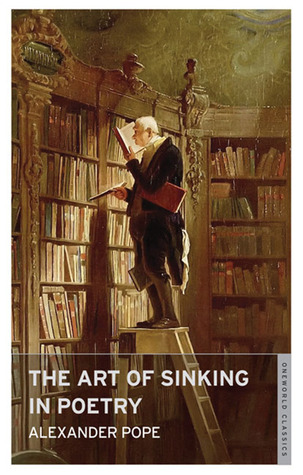Alexander Pope is considered one of England’s greatest poets of the eighteenth century, known for satirical poems as The Rape Of The Lock and the Dunciad. He was a member of the Scriblerus club, along with names like Jonathan Swift and John Arbuthnot, a circle of writers that combined in the mocking of contemporary mediocrity in science and the arts. Works borne of this group were sometimes attributed to their fictional founder, Martinus Scriblerus.
Amongst the recognised output of Scriblerus’ was Peri Bathous, or The Art Of Sinking In Poetry (1727), Pope’s satirical attack on the poets of his day. Where criticism and disdain may be best put upon inferior works of literature, appreciation of this essay comes in its alternative approach: to praise bathetic instances in poetry.
Pope opens with an explanation of why it is necessary to study the poets of his day:
It hath been long — my dear countrymen — the subject of my concern and surprise that whereas numberless poets, critics and orators have compiled and digested the art of ancient poesy, there hath not arisen among us one person so public-spirited as to perform the like for the modern. Although it is universally known that our every-way industrious moderns, both in the weight of their writings and in the velocity of their judgements, do so infinitely excel the said ancients.
His essay is to be treated as an instructional piece for any poet, “to lead them as it were by the hand and, step by step, the gentle downhill way to the bathos — the bottom, the end, the central point, the non plus ultra of true modern poesy.” The first few chapters outline the reasons behind such a stance, noting that profit and gain should take precedence over the fruitless undertaking of writing for “men of a nice and foppish gusto”, not that writing for such men should be dismissed out of hand, for it would be a “great cruelty and injustice if all such authors as cannot write in the other way were prohibited from writing at all.”
In order to make it easier to understand how one may begin to ‘sink’, Pope proposes to collect “the scattered rules of our art into regular institutes” and presents us with his first maxim –
…that whoever would excel therein must studiously avoid, detest and turn his head from all the ideas, ways and workings of that pestilent foe to wit and destroyer of fine figures, which is known by the name of common sense. His business must be to contract the true goût de travers and to acquire a most happy, uncommon, unaccountable way of thinking.
— which requires the application of ideas infinitely below the object approached. In addition, he generously offers up a couple of examples from his contemporaries demonstrating how sinking may be achieved. (“Would it not be a shame if he who is smit with the love of the bathos should not sacrifice to it all other transitory regards?”)
As the lessons continue, The Art Of Sinking In Poetry calls to mind, tangentially, a book that would come some two hundred years later, Raymond Queneau’s Exercises In Style, for Pope provides a catalogue of literary terms — catachresis, synecdoche, metonymy — and works his way through them, citing ‘effective’ examples of their use. However, where Queneau would use such devices as a conscious challenge, Pope, in praising those poets who make use of them unconsciously, documents their sinking.
While there are occasions that it seems Pope is nitpicking, such as jargon, many of the poems Pope excerpts for his comical purposes are truly awful and rightly deserve a bit of a lashing. In some cases he explains why the approach is bad, while some cases speak for themselves, like the anticlimax of a couplet on the extent of British arms —
Under the tropics is our language spoke,
And part of Flanders hath received our yoke.
— or the cumbrous phrasing demanding a fire be lit:
Bring forth some remnant of Promethean theft,
Quick to expand the’inclement air congealed
By Boreas’s rude breath…
Poetry may be the focus of the essay, but its a work thay may be of interest to those who would seek to improve their writing in any literary medium, as the underlying call is for those who would write to consider what they are putting to paper. At times, Pope’s prose can feel a little confusing, a side-effect of its age, but the wit transcends the years to ensure that the book has its funny moments while getting its point across — namely, less sinking, more thinking.

1720s, poetry, essay – not in a rush to go out and buy this.
Nice cover, though.
Hey! this is a pretty awesome heads up. I’d particularly liked Pope’s *Essay on Man* and *Essay on Criticism*… it’s going on the damned list.
Thanks